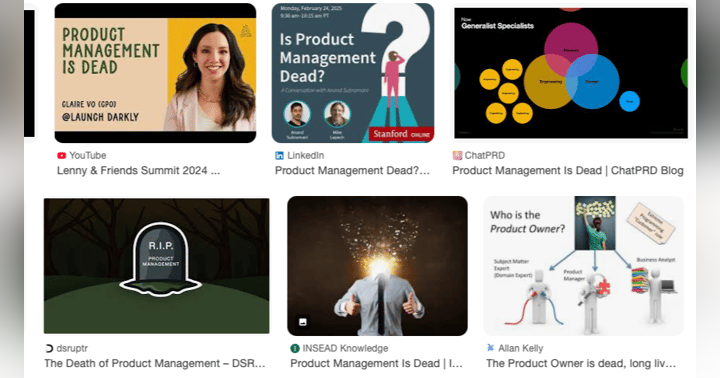The Poker Player's Guide for Product Managers

If you’ve ever played poker, you know the feeling. You don’t get to choose the cards you are dealt. But great poker players win not because they have the best hand, but because they know how to play it. They read the table, make smart bets, and manage risk over time.
While poker can involve gambling elements, professional poker is considered a skill-based game that requires strategic thinking, reading opponents, and risk management.
Product management works the same way. It’s not about getting lucky with the market opportunity or getting to work with a dream team. A PM doesn’t control many of the variables - market conditions shift, competitors make their moves, internal priorities, funding and resources change. So what can we learn from champion poker players?
Luck and Skill Are Not Zero-Sum Opposites
According to Greg Raymer, World Series of Poker Champion, and one of the highly regarded poker players, luck and skill are not on the same spectrum. They are unrelated and more like the figure above.
Tic-tac-toe is low skill (even a child learns quickly) and low luck (your opponent making a mistake). Chess is high skill and low luck (again your opponent making a mistake). Roulette is all luck and no skill.
Poker on the other hand requires lot of luck. But it also requires lot of skill. In the long run, the more skillfully you play, the better off you are.
The same is true for product managers. Let's look at the luck and skill factors.
Luck Factors:
- First PM Role:For aspiring PMs, getting that initial break into PM comes to timing, being in the right place, meeting the right people at the right time.
- Company Choice:Joining a company that's having tailwinds vs headwinds can impact career trajectory.
- Manager/Team: Having a supportive manager and a high-performing team can accelerate growth.
- Product: Whether you work on a strategic product or a maintenance product can also make a difference.
Skill Factors:
- Growth Mindset: How quickly we learn and grow from experiences.
- Relationships: Ability to build trust, influence without authority and navigate the org.
- Language of Business: How well we understand what creates impact for the business, and understand the business end of the product.
- Execution:Track record of managing complexity to deliver results.
The key is to maximize what is in our control, which allows us to capitalize on lucky breaks when they come.
You Don’t Control the Hand You’re Dealt
very product manager walks into a situation they didn’t create. We inherit the product, the market, customer demands, commitments made to customers, XFN teams, internal politics, resource constraints and so on. Some of these things work in our favor. Some don’t.
We don’t get to reshuffle the deck. But we do get to decide how to play the hand. What do we prioritize? What do we say yes to and what do we say no to? Do we push forward aggressively on a new product bet, or do we continue to wait for more signal? Do we invest in a feature only a couple of large customers are asking for, or do we push for something more forward-looking?
Regardless of the dynamics of the environment, we still get to sit at the table and decide how to play. How we play makes a ton of difference.
The Other Players at the Table Matter a Lot
Poker isn’t just about cards. It’s also about other people sitting at the table. Some players are aggressive, and force you to adapt. Others are more conservative, waiting for the perfect moment to act.
For a PM, those other players are leadership team, cross-functional (XFN) stakeholders such as engineering, marketing, sales, customer success, finance, etc. They all have different risk tolerances. Some will push for big, bold bets. Others will challenge your moves, forcing you to defend your bets.
Understanding their styles and incentives helps in how we play our hand, navigate decisions, how to have crucial conversations, influence and gain support for the product strategy and roadmap. Great PMs know how to manage these dynamics. The best PMs don’t fight the system, but figure out how to play it.
And then there’s the house - the company itself. Every company has its own set of rules, constraints, and ways of working. The company ultimately cashes in on the wins.
Reputation at the Table Matters
In poker, how you play influences how others respond to your moves. Making reckless bets signals you're not a skilled player - other players won't respect your raises and will call your bluffs more often. If you play too safe, you become predictable - when you finally make an aggressive move, skilled players will see right through it and fold. The best players build a balanced reputation.
Same goes for PMs. Our track record with leadership, stakeholders and XFN partners directly impacts our influence. When we consistently show thoughtful decision-making backed by strategy and data, we build trust. People learn that when we recommend something, it's worth taking seriously. This translates into more organizational support, or more "chips" to play with. Leadership becomes more willing to give us bigger budgets, more headcount, and greater autonomy to lead our product area.
In both cases, reputation isn't built overnight - it comes from consistently demonstrating good judgment and delivering results. And just like poker chips, the organizational trust we build up gives us the flexibility to make the moves when big opportunities arise.
It’s a Game of Repeated Hands
In poker, a single hand doesn't define success - even the best players lose hands. What separates great players is their long-term perspective. They know poker is a game of repeated decisions. While luck determines what cards you get, skill determines how you play them, manage your bankroll, read opponents, and adapt your strategy.
The same applies in product management. Not every product bet will be a winner - that's just the nature of building things in uncertainty. Features might see low adoption. Competitors might launch something that leapfrogs us. Internal politics might kill some initiatives. But strong PMs don't let individual setbacks throw them off their game.
Instead, they focus on making quality decisions consistently over time. They treat each "hand" as a learning opportunity - analyzing what worked, what didn't, and why. They study the "table" dynamics - user needs, market trends, competitive landscape, technology trends, internal constraints, and XFN relationships. They refine their strategy based on new information. Most importantly, they maintain perspective - knowing that their success isn't measured by any single outcome, but by their ability to make good choices repeatedly and adapt as conditions change.
The key is to stay levelheaded, trust the process, and keep playing our best game - knowing that skill will win out in the long run.
Summary
If you are a PM, adopt the poker player’s mindset, and face! Play the hand you’re dealt with skill. Read the table. Manage risk. Decide wisely. Build a reputation that earns you trust. And most importantly, remember that it is a long game. Keep making smart bets, and over time, you’ll win more than you lose. And, yes, play responsibly!









